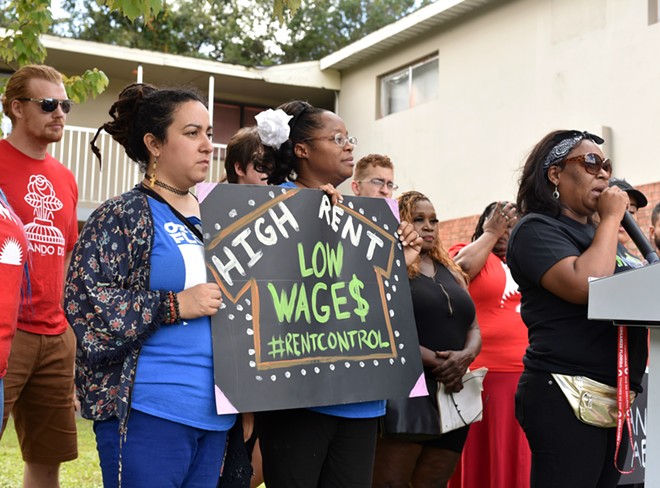Last year, over 225,000 Orange County residents — or nearly 60% of voters — voted to temporarily cap rent increases at no more than 9.8%, to help stabilize the county’s skyrocketing rent prices.
But now, even after voters made their voices heard, it looks like that relief isn’t coming.
On Monday, the Florida Supreme Court opted not to take up a legal dispute that arose between Orange County and the Florida Realtors and Florida Apartment Association, two industry groups that filed a lawsuit to block the rent stabilization measure from going into effect.
This means a December ruling by an appeals court, siding with the trade groups, will remain in place — essentially leaving the popular rent stabilization measure dead in the water.
“The Court’s decision today only affirms that our state government [would] rather stand with greedy corporate landlords represented by the Florida Realtors and Florida Apartment Association over Black, Brown, and working-class tenants, 59% of Orange County voters who made themselves clear at the ballot box, and a statewide movement to demand an end to runaway rents for profit,” Cynthia Laurent, a housing justice organizer for Florida Rising, told Orlando Weekly in a statement.
Florida Rising, along with a coalition of social justice advocacy and labor groups, organized to get the rent stabilization measure on the November ballot last year, knocking on doors and showing up to county commission meetings to advocate for direct action.
On the county side, county commissioner Emily Bonilla championed the measure. In a presentation to the board, Bonilla pointed out that Blue Rock Residential’s year-over-year profits were up 1,295%, Camden Property Trust up 526% and the Preferred Apartment Communities up 425%. She proposed to cap year-over-year rent increases at 5% for landlords who own more than four properties.
At the time, Florida law required that any form of rent stabilization idea first go to voters to decide, provided the county could show evidence of a housing emergency “so grave as to constitute a serious menace to the general public.”
And that was the heart of the lawsuit. The industry groups Florida Realtors and the Florida Apartment Association — both mega donors to politicians, who organized a $2 million dollar opposition campaign against rent stabilization — claimed the county didn’t prove a housing state of emergency, in violation of procedures required under state law.
The industry groups also want the Orange County government (and thereby, taxpayers) to foot their attorney fees. This is still a subject of ongoing litigation, according to a county spokesperson.
Five of seven Florida Supreme Court justices take part in decisions whether to hear cases, and four out of five justices (three of them DeSantis appointees) agreed not to take up the case. Justice Jorge Labarga, appointed in 2009 by then-Republican governor Charlie Crist, was the sole justice in favor of hearing oral arguments.
As it is, rent control for Orange County, or any other city or county in Florida, won’t be coming any time soon.
Last month, Florida Governor Ron DeSantis signed into law a massive housing bill that prohibits local governments in Florida from pursuing any kind of rent stabilization or rent control, now or in the future.
Dubbed the “Live Local Act,” that legislation — supported by the very industry groups that sued Orange County — was fast-tracked through the Florida Legislature. It garnered bipartisan support, mostly for the tax incentives it’ll throw at developers to build more ostensibly “affordable” housing.
A sweeping housing bill in Florida that completely preempts rent control has passed the Florida House, 103–6.
Opposition came from 5 Democrats, 1 Republican. The bill already cleared the Florida Senate earlier this month with unanimous support. pic.twitter.com/4FcMKiFPTF
— McKenna Schueler (@SheCarriesOn) March 24, 2023
Local rent stabilization advocates, who saw how skyrocketing rent was harming their communities last year — resulting in eviction, homelessness, and forcing residents to move away for someplace cheaper — are disappointed with this outcome.
But they say the fight to keep folks housed and foster a community that’s hospitable for everyone isn’t over.
“We will be working diligently in our communities to make sure Floridian residents can indeed stay in their homes and have the resources they need to support themselves as our legislature works around the clock with corporations to take that away for millions of families,” said Jonathan Alingu, executive director of Central Florida Jobs with Justice, which advocated for the measure. “The fight for justice, quite literally, will start from our homes.”
Laurent, with Florida Rising, added, “While the outcome is disappointing, Florida Rising and our members are committed to continuing to organize on every block and work alongside local elected leaders at the Orange County Commission and beyond, to develop community-led solutions to the housing emergency despite state judicial and legislative interventions to undermine the people.”

